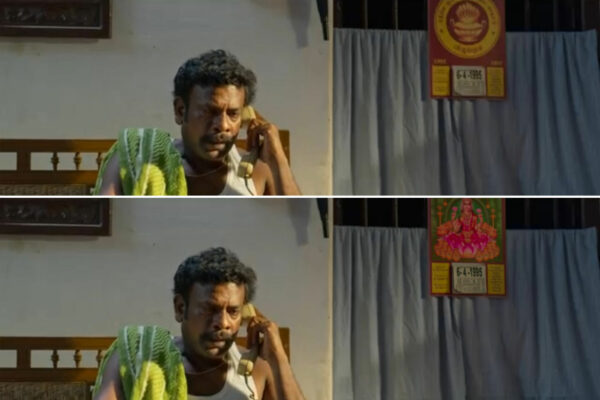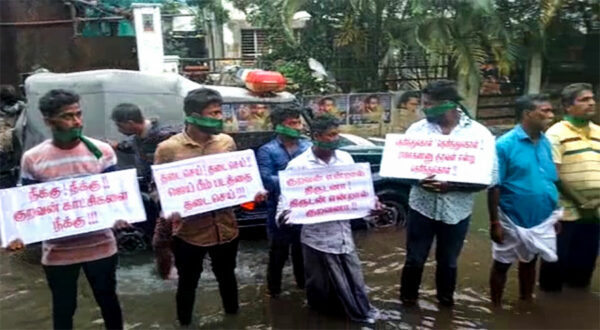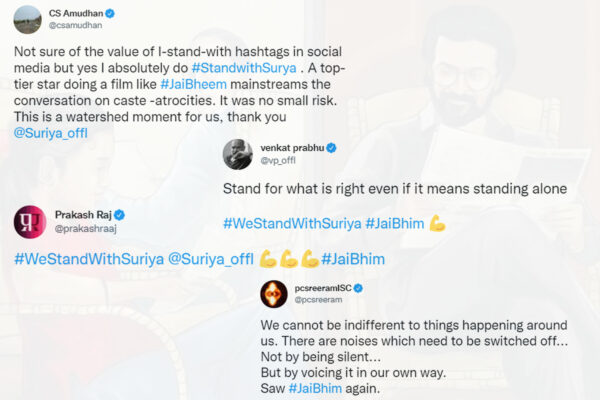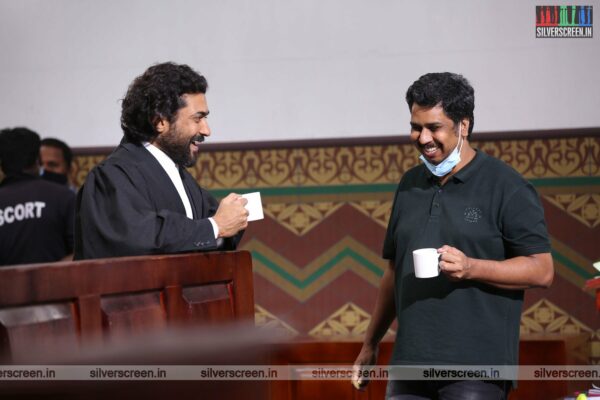On November 15, the hashtag #WeStandWithSuriya began trending on Twitter with prominent film personalities and the public expressing solidarity with actor-producer Suriya, who had recently come under the scanner for his film Jai Bhim.
Written and directed by TJ Gnanavel, the film is produced by Suriya’s 2D Entertainment. While it received acclaim from several quarters and even surpassed The Shawshank Redemption (1994) to become the highest-rated movie on IMDB, Jai Bhim has seemingly offended a few sections.
Silverscreen India breaks down the various controversies that the film has stirred up since its release on November 2.
What is the film about?
Jai Bhim was released on Amazon Prime Video as part of 2D Entertainment’s four-film deal with the streaming platform. The film features Suriya as a lawyer who fights for justice for people from the Irular tribal community. Also starring Lijomol Jose, Rajisha Vijayan, and Prakash Raj, it deals with the police brutality and custodial deaths that the community faced. The film is based on a real-life case fought by retired Madras High Court Justice K Chandru, when he was an advocate in the 90s.
It is also notable that the term ‘Jai Bhim’ is a slogan used by followers of BR Ambedkar, who fought against the economic and social discrimination of marginalised communities, particularly Dalits.
Criticism from the Vanniyars:
Vanniyars, a caste group in Tamil Nadu, took offence to a scene set at the antagonist police officer’s house, that showed a calendar with a fire urn – a symbol that is said to denote the Vanniyar community. While some took to social media and questioned if the symbol was necessary, others termed it a “deliberate mistake” and an “indirect attack” on the community. It is to be noted that Anbumani Ramadoss, leader of the Pattali Makkal Katchi (PMK), a political party that represents the Vanniyar caste, has a tattoo of the symbol in question on his arm. The members of the caste believe that the community was born out of fire and thus, the fire urn is their symbol.

Soon after, the makers of Jai Bhim digitally altered the symbol on the calendar to an image of the Hindu Goddess Lakshmi. Despite this, Anbumani put out a four-page statement alleging that the film has deliberately shown the community in bad light. He put forth nine questions regarding the film, including why the bad cop was named Gurumoorthy – a name that resembles that of “one of the frontline leaders” of the Vanniyar Sangam – when, in the real case, his name was Anthony Samy.
Suriya’s reply:
In his reply to Anbumani, Suriya clarified that the film is a fictitious take on real events and pointed out that it carries a disclaimer to that effect as well. Adding that unintentional errors had been corrected (referring to the modification of the calendar design), the actor said, “I agree with you that no one has the right to insult any community or group in the name of creative freedom. Likewise, I hope you will agree that creative freedom should also be safeguarded from threats.”
With regard to the name of the cop character, Suriya said, “A journalist had mentioned that the same name hints at another community. If we keep second-guessing like this when it comes to antagonistic characters, there will be no end to it. Such ‘name politics’ will only distract those who must come together to fight injustice.”
Vanniyar Sangam issues notice:
Unsatisfied with Suriya’s reply, Vanniyar Sangam’s state president, Pu Tha Arulmozhi issued a legal notice to the makers of Jai Bhim for “criminal and civil defamation.” The organisation, founded by S Ramadoss in 1980, demanded that the makers tender an “unconditional apology,” remove “defamatory scenes” from the film, and also pay Rs 5 crore as damages. The legal notice named 2D Entertainment, Suriya and his wife, actor Jyothika, TJ Gnanavel, and Amazon Prime Video.
The Vanniyar Sangam also wrote to the Directorate of Film Festivals, the Ministry of Information and Broadcasting, and the Information and Public Relations Department, asking them not to consider Jai Bhim, for any recognition or appreciation. The letter cited various scenes in the film that were “defamatory” and that intended to “cause disrepute” to the community. The letter also stated that certain scenes were “deliberately included with a view to creating communal disharmony.”
The organisation also filed a complaint with a court in Chidambaram, under section 199 (6) of the Criminal Procedure Code for Offences and under sections 153, 153A (1), 499, 500, 503 and 504 of the IPC.
Criticism from other factions:
Vanniyars were not the only ones who had a problem with the film.
Earlier, the film took heat for a scene involving actor Prakash Raj’s character slapping another for speaking in Hindi. Certain sections of social media said it showed “hate” for the Hindi language. Responding to the issue, Prakash Raj, in an interview with News9, said, “After watching a film like Jai Bhim, they did not see the agony of the tribal people, they did not see and feel terrible about the injustice, they saw only the slap. That is all they understood; this exposes their agenda.”

Later, members of the Kuravar tribe protested outside Suriya’s residence in Chennai claiming that the film showed their community in a poor light. Demanding that the offending scenes be removed, about 10 to 12 members of the community, each with a green cloth tied over their mouth, protested in ankle-deep water amid the rains in Chennai on November 11.
Speaking to Silverscreen India, Sampath, the general secretary of the youth wing of the Kallakurichi Malaikuravar Adivasi Nala Sangam, had said, “At the beginning of the film, there is a scene that takes place outside a jail, where a member of the Kuravar community is assumed to be a thief by a policeman. This amounts to saying that Kuravars are thieves. To oppose this, we staged a non-violent protest in front of Suriya’s house.”
The protesters also questioned why the protagonist Rajakannu, who was a Kuravar in real life, has been portrayed as an Irular in the film. “While Rajakannu is shown as an Irular, Kuravars shown as thieves,” said another member during the protest.
Support for Suriya:
Following these controversies, various film personalities and the general public came out in support of Suriya. Filmmakers such as Pa Ranjith, Venkat Prabhu, CS Amudhan, Vetri Maaran, cinematographer PC Sreeram, actors Siddharth and Prakash Raj, all expressed solidarity with the actor on social media.

The South Indian Film Chamber of Commerce also released a statement in support of Suriya. The body expressed disappointment with the continuous criticism the actor was subjected to over the film.
Earlier, speaking to Silverscreen India, film observer and writer Stalin Rajangam had said, “What we need to observe is the pattern of controversies that are thrown at films like these that talk about the oppressed.”
“Jai Bhim is playing a big role in spreading this necessary message about how the oppressed are treated in society,” said J Balasubramaniam, a faculty member of the journalism and science department at Madurai Kamaraj University. “Just keeping a title like Jai Bhim, that too for a film headlined by a popular star, is itself quite progressive for Tamil cinema, which has had films named after castes in the past.”
Associations such as Tamil Film Active Producers Association and Tamil Nadu Movie Makers Sangam also expressed support for Suriya.
This apart, several tribal communities, such as Kattunayakan, Sholaga, Adiyan, Kanikkar, gathered in Madurai on November 22, to show their solidarity for the actor. They also thanked Suriya for highlighting their plight with the film.
Santhanam’s statement and the counter hashtag:
Even as the #WeStandWithSuriya hashtag took over Twitter, an opposing section of social media users began trending the hashtags #WeStandWithSanthanam and #SuriyaAgainstVanniyars, after comedian-actor Santhanam commented on the controversy during a press meet for his film Sabhaapathy.
Recommended
When asked for his view on the issue, Santhanam, who is considered an ally of the PMK party, said it is not right to portray one group of people in a poor light in order to glorify others. However, he did so without taking the names of Suriya, Vanniyars or the PMK. It is to be noted that Santhanam had, in September, expressed his elation upon meeting S Ramadoss, Anbumani’s father and the founder of PMK, at a family wedding.
Threats and Protection:
The Mayiladuthurai district secretary of PMK, Sitthamalli A Palanisamy, meanwhile, announced a cash prize of Rs 1 lakh for anyone who would assault Suriya when the actor visited the district. The group also stopped screenings of another Suriya-starrer, the 2007 film Vel, in a theatre in Mayiladuthurai. Following this, a team of armed police personnel was deployed at the actor’s house for protection.
Statements from the Jai Bhim team:
While majority of the Jai Bhim team stood together, two statements from the team members are to be highlighted – one in support and the other opposed.

Director Gnanavel released a statement expressing regret over the controversies his film had caused and said it was not right to drag Suriya into them. Referring to the calendar scene, the director said its intention was simply to refer to the time period (90s) and not to symbolise any community.
On the other hand, Kanmani Gunasekaran, who served as a dialogue writer for Jai Bhim, expressed disappointment and said he returned the Rs 50,ooo that he received as payment for working on the film. In a Facebook post, he mentioned that Gnanavel approached him to pen the dialogues with a native touch, but said he was unaware of the calendar scene. He said that his sentiments were hurt when he found out.
There have been no updates on the legal cases filed over Jai Bhim.



